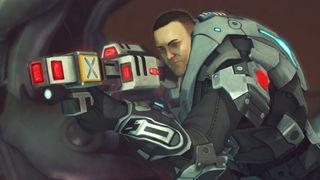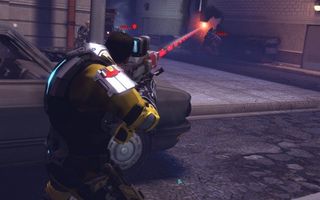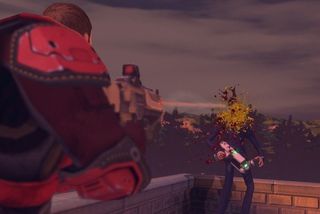Interview: XCOM Lead Designer on the response to Slingshot DLC, death and loss in games

While Firaxis' Jake Solomon and I were talking about the addition of The Second Wave to XCOM: Enemy Unknown, our conversation shifted to the game's poorly-received first paid DLC, Slingshot . From there, he also reflected on players' response to XCOM's difficulty and how 2012 was a banner year for "consequence" as a concept in video games.
PCG: Other than The Second Wave , what XCOM updates will we see from Firaxis this year? Are you planning to release more DLC along the lines of Slingshot?
Solomon: Not along the lines of Slingshot. We haven't announced our next steps, although we have, I think, publicly announced that there is going to be more content in 2013. What I'm saying is that I don't disagree with anything anybody is saying that they want. We all, as a team, completely agree that XCOM is a great platform for more things, basically. More items and aliens and maps. We totally get that. It's just that those things take time.
That's the sort of thing that we're excited to continue to work with on XCOM. We look at XCOM as a sort of platform for this stuff. People should definitely know that we're committed to it. We hear what people want and we totally agree. We haven't heard anything where we disagree. We're in tune with that. We've got our ears to the ground.
That's encouraging. A lot of people, including us , weren't totally satisfied with Slingshot. How have you personally, or Firaxis as a whole, received that feedback? Do you agree with it?
Solomon: I think we agree with it. What it really came down to is that that was a content-heavy DLC, but it wasn't a system-heavy DLC. I think that what people wanted… I don't know that we were surprised by some people saying, "Hey, what I wanted was more elements in the system. I wanted more aliens and guns and items." Whatever people wanted. I think that's something that we agree with, and we maybe weren't surprised by it. We just didn't have the throughput to add more items to the system yet. A lot of that, frankly, if I can be entirely honest, is probably my fault. My design came together so late that a lot of things… We spent a lot of engineering time at the end just on getting the game completed and out there.
Certainly people have enjoyed Slingshot, but the criticisms that it's linear and that it's unlike the rest of the experience are fine. I don't even disagree with that. I don't think anybody does. Our goal is to support people in the way that they want to play XCOM. We are not the kind of people to enforce a design philosophy on people. It's been fun to watch people play the game, put so many hours into it, and say, "Okay, these are the things we value. We value this thing and this thing. We want more of this and more of that." For us, it's our job to say, "Absolutely." If people are going to pay their hard-earned money for our product, it's our job to listen to that and say, "We can give you more than that." It's not like we disagree with it either. I think it's the sort of thing where, for us, it just takes time.
PC Gamer Newsletter
Sign up to get the best content of the week, and great gaming deals, as picked by the editors.
Appreciate your candor about that.
Solomon: Yeah, of course. If I try to be anything, it's honest. We have some exciting stuff coming up. The Second Wave is kind of the first step in that. Because it's free and… It's not adding more elements to the system, but it is adding more ways for the player to interact with the game and get some more gameplay out of it. Hopefully people will get a lot of enjoyment out of that.

I saw on Twitter that you received a humorous but serious notification of your own death from a fan? A pair of dog tags that came from a fan…
Solomon: I have them sitting with me right now, yes.
How did you feel when you received that?
Solomon: Well, I thought it was awesome. Somebody went to the trouble to make dog tags for me, so I thought it was awesome. It's funny, because it sounds like I'm joking, but I'm not. My wife was really disturbed by it, because at first I didn't understand what it was. I got these two letters, both of which were addressed to my wife, to "Mrs. Jacob Solomon." And I'm like, "What the hell? Who's writing my wife?" But then I realized what it was. "Oh, wait a minute, this is a notification of death letter. Oh my god, this is so awesome." I didn't want to read it. I wanted my wife to read it. But my wife was truly… I'm not saying this as an exaggeration. My wife was disturbed by this. She was very disturbed. Obviously she's not as tied in to XCOM as I am.
I thought, "Oh, this is cool." But my wife was disturbed by the fact that somebody sent her dog tags with my name on them and then two letters that described my death, talking about how they're sorry for her loss. My wife… She didn't think it was funny. I think it's awesome. I personally find it to be the coolest thing I've received. But my wife… I had to take it to the office, because she hated even having that kind of stuff in the house. So yeah. I love it. I think it's a trophy. But it has to stay at the office.

Along those lines, now that you've had a few months after release—has the response to XCOM has changed your attitude about how contemporary gamers view death and losing?
Solomon: …Yes, it has. That's a good point. Too many times, as designers, we get into a sort of a back-slappy mode when our games come out and they do well and they're successful. It's very easy to sit back and pretend that you knew. "Oh, of course it succeeded, because I knew that we'd be breaking ground with this." [laughs] That's not actually true. It was something we worried about quite a bit. What it came down to was that when we made any changes to that, it really didn't feel right. I just kept thinking, "If we do this, this isn't XCOM." We expected people to lose. We expected people to lose soldiers. We had the benefit, obviously, of playing the game internally. We really liked it. People on the team were actually playing the game towards the end of the project… I don't want to sound condescending. But it's rarer than you might think. So we had an inkling that it was going to work.
But it definitely has changed my perspective. The difficulty levels, like Ironman… I don't know that I've told people before, but Ironman came in very late. It wasn't an afterthought—it was something I wanted, because that was how I played the game—but that came in after alpha. Ironman came in well after alpha. It was a feature that I wanted, that I wanted really badly, and it came in far later than it should have. I didn't expect Ironman to become… For people who've beaten the game multiple times, it becomes the standard way to play the game. I did not expect that. That was not my intention at all. I expected it to be a little bit more like Diablo's hardcore mode, where just a couple of people play that way. Instead, with XCOM, it became, "Oh, no, that's the way you play the game, because that's how you experience that real sense of loss and emotion." I was surprised by that. It's one of those things where I constantly, constantly am thinking to myself, "Thank god we put that in." Because we all wanted it, but that was post-alpha, and there was a very real chance that it would be like… If the Ironman system had had a lot of bugs, it would have been like, "We can't fix this. This isn't going to work." Instead it's become this thing that has really taken on a life of its own.
"People on the team were actually playing the game towards the end of the project… I don't want to sound condescending. But it's rarer than you might think."
It has changed the way that I've looked at the game. Looking forward now, it's like, "Okay, if Ironman is a core part of the game…" What if, in the Foundry, you could say, "I want you to take this laser weapon…" Kind of like in Torchlight, where you can go to the guy and say, "I want you to enchant this weapon." There's a chance that the enchantment is actually a curse. I was thinking… That'd be awesome in XCOM, if you could be like, "Look, I want to shoot the moon on this. I want to push it with these laser weapons." And there could be a chance, if you're playing Ironman, where it's like, "Uh-oh. Laser weapons overheat." Maybe they do more damage, but they overheat now. It's changed my opinion on how people are willing to accept consequence. It becomes this enjoyable thing where, if you lay it out for them and they know what they're getting into, then consequence is something that they're willing to accept. They get a lot of enjoyment out of it. To that extent, I think all of us have been surprised by that.

It's been an interesting 2012 trend for us at PCG as well, looking at DayZ and FTL...
Solomon: Right! FTL came out at almost the same time. Yeah, FTL gives you that same sort of experience. People are willing to deal with those consequences because they create those emotional experiences. I think that it makes your success authentic because your losses are authentic. As a gamer, you can get kind of tired of experiences where you know you're not actually risking anything. I still like playing games where maybe you're not risking anything, but it's fun to play games where you are putting something on the table.
You know what else? I think back to the PAX panel, the storytelling panel. That was kind of neat too, because that was before the game came out. One thing I'll say… It's been an interesting year in games, because you do have things like DayZ and things like XCOM. But also, The Walking Dead. Sean [Vanaman] was on that panel, and I'm telling you… That was a game where it opened my eyes, too. It also has consequences, but it does it in a completely different way. That sense of… I played that game, and I won't lie. I went to it thinking, "This is not my kind of game." I'm more of a Minecraft, DayZ kind of guy… I don't want a story dictated to me. But man, I'm telling you, that game achieves the same type of emotional highs and lows, and it does it in a way that I completely didn't expect. For me, that game has been a major revelation. I love that game. It's shocking to me, because I don't love any other game that's even like that. That game does the same sort of thing with consequences, but it does it in a completely different way. Sorry, I went way off the reservation there.
http://www.youtube.com/watch?v=Qkr_xYRG6bo
No, this is good to share.
Solomon: Yeah. The idea of consequences is something really interesting, because DayZ is… I know you're a big DayZ player. That and Walking Dead and FTL and XCOM, you're right. 2012 was almost the year of consequence. Players, I think, are looking for authentic experiences. These are games that give you those real, authentic emotions when you play.
And difficulty, too, which I think of as being related to but separated from consequence. You look at Dark Souls as well, and the popularity that's had on all platforms. And Amnesia, in 2011. I think people are ready for brutal experiences again.
Solomon: I think that's true, and I think that it's been the sort of thing where… The pendulum swings a little bit. I don't honestly know. My head is so far down in my own development experience. But it's funny how all these things have coalesced. Maybe that's a coincidence, although it's probably not. It's probably people acknowledging that… There were some forerunners with Dwarf Fortress and Minecraft's survival mode. Then you have these experiences where then you do get things like FTL or XCOM or DayZ. I think people are ready for these experiences are that are bringing a little more of the challenge back into games. I love playing narrative-driven shooters, but there's a lot of ways to get your fill of that. Maybe there was a void that some of these games are filling.
Thanks for your time, Jake.
The Second Wave is being patched into XCOM later today.

Evan's a hardcore FPS enthusiast who joined PC Gamer in 2008. After an era spent publishing reviews, news, and cover features, he now oversees editorial operations for PC Gamer worldwide, including setting policy, training, and editing stories written by the wider team. His most-played FPSes are CS:GO, Team Fortress 2, Team Fortress Classic, Rainbow Six Siege, and Arma 2. His first multiplayer FPS was Quake 2, played on serial LAN in his uncle's basement, the ideal conditions for instilling a lifelong fondness for fragging. Evan also leads production of the PC Gaming Show, the annual E3 showcase event dedicated to PC gaming.
Most Popular


